The backwaters of Kerela, India between the Lakshadweep Sea and the Western Ghats, are a tourist hotspot in Southwestern India for one reason: houseboat tours. There are 900km of waterways and more than 500 nearly identical boats in Alleppy alone, design-inspired by the heaping rice barges that still haul crops to town.
Normally, tours spend 24hours in the backwaters: departing at lunchtime from the jetty and returning just after breakfast the following day. Boats travel en masse: like many travel experiences in the developing world, once someone started something tourists would pay for, everyone else copied the experience verbatim. All boats go the same direction at the same time, tie up at the same levee for the night, and probably serve the identical 3 meals and 2 snacks. We asked for a two-night trip, hoping to break the mold and get to solitary places outside the swarm of boats and compulsory stops at the island mini-mart (selling plastic soda bottles, single-serve bags of chips, and “fish”).
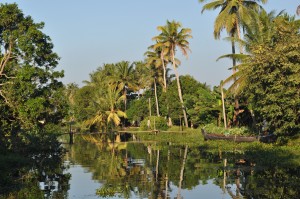 I think what we found so delightful about the backwater cruise was the pace of travel. Too many times we fling ourselves at breakneck speeds on planes, trains, and automobiles through beautiful landscapes and dense cultural experiences, on our way somewhere else. The backwater boats, ours in particular, traveled at walking speed through clumps of net-fishing, pole-driven canoes and diving cormorants, along the narrow canals separating perfectly square marshy rice paddies framed by mud-and-concrete breakwalls. If the canals are the “highway”, the “sidewalks” are the foot-wide mesa of foot-flattened mud. Houses, from tin-roofed concrete- block to bamboo-tin-thatch design, are arranged on earth dug from the rice paddies. The flood-buffer offered by the breakwalls is less than a meter high. The rice fields are easily two meters lower than the lake, periodically flooded according to rice-growing schedule. Some homes are spartan and ramshackle, others are brightly painted with satellite dishes adorning shiny rooftops.
I think what we found so delightful about the backwater cruise was the pace of travel. Too many times we fling ourselves at breakneck speeds on planes, trains, and automobiles through beautiful landscapes and dense cultural experiences, on our way somewhere else. The backwater boats, ours in particular, traveled at walking speed through clumps of net-fishing, pole-driven canoes and diving cormorants, along the narrow canals separating perfectly square marshy rice paddies framed by mud-and-concrete breakwalls. If the canals are the “highway”, the “sidewalks” are the foot-wide mesa of foot-flattened mud. Houses, from tin-roofed concrete- block to bamboo-tin-thatch design, are arranged on earth dug from the rice paddies. The flood-buffer offered by the breakwalls is less than a meter high. The rice fields are easily two meters lower than the lake, periodically flooded according to rice-growing schedule. Some homes are spartan and ramshackle, others are brightly painted with satellite dishes adorning shiny rooftops.
Traveling slow gives us time to take in life as it unfolds here every morning, every evening. We read Annie Dillard on our Nooks. Amanda turns her Icelandic yarn into complex shapes and patterns. We journal. We photograph, watch waterbirds dry their wings on tiny, floating hyacinth islands, arrange playlists that capture our moods. We nap. We discuss the origin and meaning of the ubiquitous South Asian head-bob (does it mean yes? No? Maybe? I’m not sure? Is there a different version for ‘mostly-yes- but-possibly-no’ vs. ‘most-likely-no- but-maybe-yes’? Could we film it and play it back in slow-mo to find out? Do we look like we’re having a head-twitching seizure when we attempt it?) We watch the scenery pass like a palm-fringed filmstrip: flat blue water punctuated by green leafy islets, sleek canoes, white egrets, colorful laundry drying in the stillness.
Happy to be here, just happy to lay here… differentiating shooting stars from lightning bugs, challenging each other to geography trivia, feeling the brush of wind from the swooping wings of flying foxes, reading Jungle Book aloud, and collectively singing along with, of all things, The Sound of Music soundtrack.
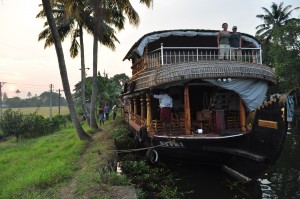 The goat gets tied up to the banana tree a few meters from our breakfast table. A shirtless, saronged grandfather paddles his toddler grandchild in a skinny canoe, collecting the falling coconuts a young man is hacking out of a too-high palm tree he climbed expertly, feet bound together by a yellow cord to facilitate his ascent. Uniformed children board the “school bus boat” and wave at us.
The goat gets tied up to the banana tree a few meters from our breakfast table. A shirtless, saronged grandfather paddles his toddler grandchild in a skinny canoe, collecting the falling coconuts a young man is hacking out of a too-high palm tree he climbed expertly, feet bound together by a yellow cord to facilitate his ascent. Uniformed children board the “school bus boat” and wave at us.
“Backwater” sounds like an insult, a derogatory description of the people who call this home, but we watch the day’s activity with admiration of these Backwater dwellers. Men carrying 75kg bags of rice on their heads, women brush their teeth, clean clothes, fish, rice, and children on their canal-stoop. Four brightly-smiling kids meet us on the narrow path practicing their English: What is your name? What is your country? They shake hands, giggle, display sets of perfectly white, straight teeth, and bound off to their uncle’s house down the “highway”.
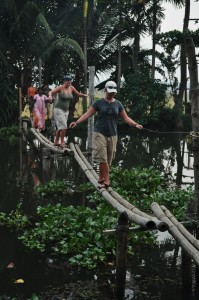 We take a walk at sunset along the sides of a canal too shallow for our houseboat. We spy a rickety (this is a generous description) bamboo bridge reaching the other side, and Kate wonders aloud what our “bottom line” is to cross. (Bottom Line is a game we play frequently while traveling: one person proposes a (usually) terrifying or (more often) disgusting endeavor. The responder must come up with an amount of cash-in-hand that would be required to complete the task. (Examples include: “What’s your bottom line to lick the NY Subway C-train pole from bottom to top?” “What’s your bottom line to drink a glassful of the Hookah water?” Answers range from $100 to tens of thousands). Apparently, the mere existence of the bridge is Jeff’s bottom line to attempt a crossing. Amanda follows next, appearing calm and ballerina-graceful. Peer Pressure, it turns out, is Kate’s bottom line to cross the swaying, bouncing, creaking bridge. Compounding the unsteadiness there was a clear sensation that the entire bridge was moving downstream, owing to the movement of the leafy waterplants floating below. The hand-hold is a loosely tied wire: loose enough to NOT keep a falling human being from plunging into the meter-deep canal, if we were to lose our balance. We all manage to keep our balance, both to and fro. But we look like mountain gorillas on a slackline, requiring 20 minutes to awkwardly complete a task folks here master at age three.
We take a walk at sunset along the sides of a canal too shallow for our houseboat. We spy a rickety (this is a generous description) bamboo bridge reaching the other side, and Kate wonders aloud what our “bottom line” is to cross. (Bottom Line is a game we play frequently while traveling: one person proposes a (usually) terrifying or (more often) disgusting endeavor. The responder must come up with an amount of cash-in-hand that would be required to complete the task. (Examples include: “What’s your bottom line to lick the NY Subway C-train pole from bottom to top?” “What’s your bottom line to drink a glassful of the Hookah water?” Answers range from $100 to tens of thousands). Apparently, the mere existence of the bridge is Jeff’s bottom line to attempt a crossing. Amanda follows next, appearing calm and ballerina-graceful. Peer Pressure, it turns out, is Kate’s bottom line to cross the swaying, bouncing, creaking bridge. Compounding the unsteadiness there was a clear sensation that the entire bridge was moving downstream, owing to the movement of the leafy waterplants floating below. The hand-hold is a loosely tied wire: loose enough to NOT keep a falling human being from plunging into the meter-deep canal, if we were to lose our balance. We all manage to keep our balance, both to and fro. But we look like mountain gorillas on a slackline, requiring 20 minutes to awkwardly complete a task folks here master at age three.
Moving slowly is an art and a discipline. It means taking the slow boat. It means walking. It means letting other cars/boats/gaggles of people pass you by. It means noticing, then stopping to admire a chameleon on a jungle mountain walk. It means talking to friendly people at the train station, posing for photos with the fruit seller. It means doing less and seeing more. It means investing a couple of days or extra hours in a place, abandoning your agenda when you can, and waiting for a place to offer you a richness you didn’t expect.
Traveling is too often a frenzied pace of activity, an attempt to see every temple and city – but at the expense of feeling at peace in any one place. Go slow, stop often. Watch the birds. Smell the Jasmine.
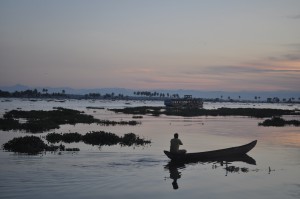 Let’s rest for a while
Let’s rest for a while
‘til our souls catch us up
Bring on the wonder, bring on the song
I pushed you down deep in my soul for too long
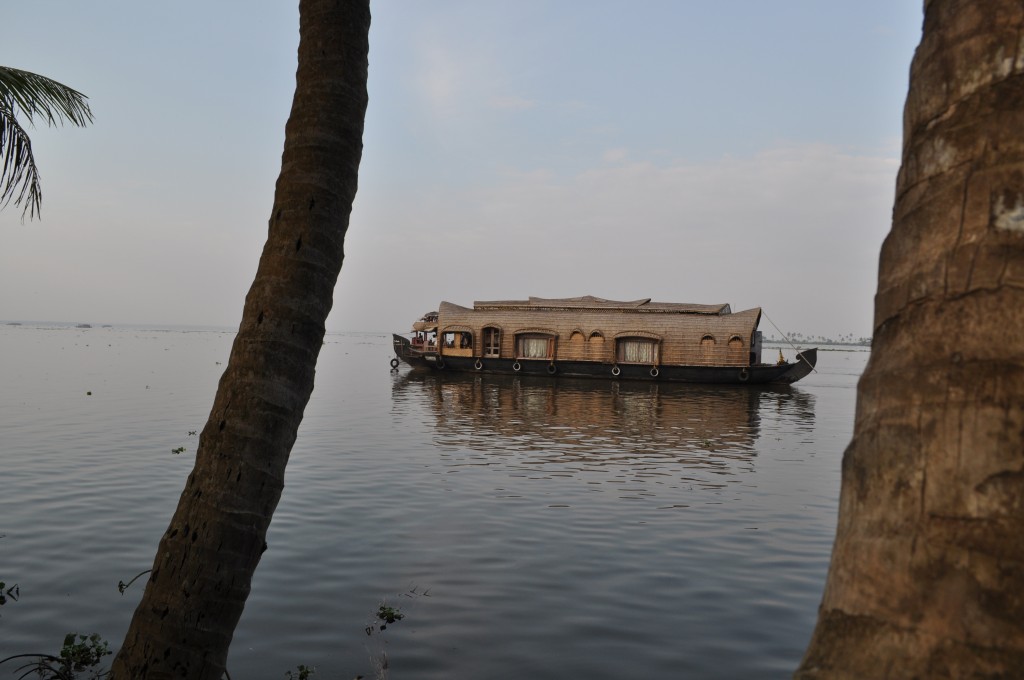
Camille just gave us the site to view your travels. It is so romantic and adventurous. You must write a book when it is all over – the description is very outstanding. Good travels to you both. I look forward to more posts.
Amanda – who knew? – from Starkville to the far reaches of the world!
au revoir, Michele
Starkville is it’s own far-reach in the world. 🙂 Thanks for following along.
Great writing! Makes me want to leave the city and hit the road again.